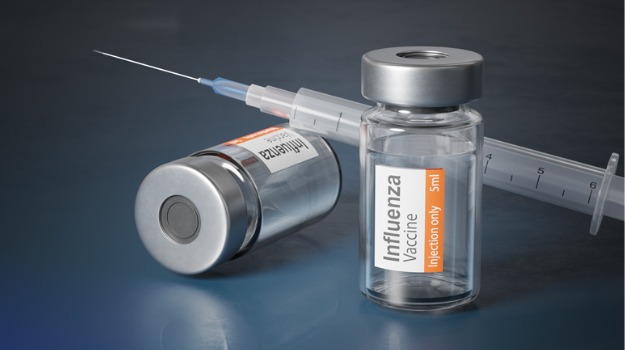Vir’s GSK-Backed Flu Vaccine Candidate Fails Phase II Trial
July 25, 2023
Source: drugdu
 486
486

Pictured: Flu vaccine vials and syringe/iStock, vchal
Topline data from the Phase II PENINSULA study showed that Vir Biotechnology’s investigational flu shot VIR-2482 fell short of its primary and all secondary efficacy endpoints, the biotech announced Thursday.
Patients inoculated with the highest 1,200-mg dose of the vaccine candidate saw a 16% drop in influenza A-like illness as compared with placebo, an effect that did not satisfy statistical significance, according to Vir’s news release. PENINSULA defined this primary endpoint as PCR-confirmed influenza A infection with at least one respiratory and one systemic symptom.
Phil Pang, Vir’s chief medical officer, called these findings “disappointing” in a statement, but nevertheless said that the company needs to conduct further analysis to “better understand these outcomes.” Vir plans to present these analyses at a future major medical congress.
PENINSULA is double-blinded, randomized and placebo-controlled study with approximately 3,000 adult patients enrolled. VIR-2482 was given as a 450-mg or 1,200-mg intramuscular dose. To be eligible, participants had to be free from risk factors that could predispose them to serious influenza complications, and they were not to have a flu vaccine for the upcoming flu season.
Among the study’s secondary endpoints is symptomatic influenza-like illness as defined by having a fever and cough and/or a sore throat, as per CDC guidelines. Compared with placebo, the highest dose of VIR-2482 elicited 57.25% relative risk reduction in this efficacy metric.
As for safety, PENINSULA results showed that the vaccine candidate was generally well tolerated and documented no concerning signals.
VIR-2482 is an investigational intramuscular monoclonal antibody that targets the hemagglutinin glycoprotein found on the surface of influenza viruses and which is crucial for their infectious activity. The vaccine candidate was designed to be prophylactic against all major strains of influenza A and to elicit protection without relying on the recipients to produce their own immune response.
In February 2021, GSK dropped $225 million and added $120 million to its equity investment in Vir to expand an ongoing collaboration to develop novel, potentially best-in-class therapies for influenza and other respiratory diseases. As part of this expanded deal, GSK earned the exclusive option to co-develop VIR-2482 after Phase II results.
Following Thursday’s disappointing data drop, the future of the GSK collaboration has “yet to be determined” and the partners are in “ongoing discussions,” a Vir spokesperson told Endpoints News.
GSK and Vir first entered into a research and development partnership in April 2020 for COVID-19. In February 2023, however, GSK stepped back from the coronavirus portion of the partnership but stayed engaged for VIR-2482 and other respiratory virus programs.
Source: bioSpace.com
By editorRead more on
- The first subject has been dosed in the Phase I clinical trial of Yuandong Bio’s EP-0210 monoclonal antibody injection. February 10, 2026
- Clinical trial of recombinant herpes zoster ZFA01 adjuvant vaccine (CHO cells) approved February 10, 2026
- Heyu Pharmaceuticals’ FGFR4 inhibitor ipagoglottinib has received Fast Track designation from the FDA for the treatment of advanced HCC patients with FGF19 overexpression who have been treated with ICIs and mTKIs. February 10, 2026
- Sanofi’s “Rilzabrutinib” has been recognized as a Breakthrough Therapy in the United States and an Orphan Drug in Japan, and has applied for marketing approval in China. February 10, 2026
- Domestically developed blockbuster ADC approved for new indication February 10, 2026
your submission has already been received.
OK
Subscribe
Please enter a valid Email address!
Submit
The most relevant industry news & insight will be sent to you every two weeks.



